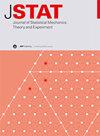流行动态的长期记忆:从公告牌热门 100 排行榜中获得的启示
IF 1.9
3区 物理与天体物理
Q2 MECHANICS
Journal of Statistical Mechanics: Theory and Experiment
Pub Date : 2024-06-16
DOI:10.1088/1742-5468/ad4e2d
引用次数: 0
摘要
本研究借鉴生态学和社会科学文献,深入研究了作为人口动态重要方面的流行动态。重点在于构建一个准确的模型,以了解新奇事物、流行语和影响力在人类社会中的传播,尤其是通过 YouTube、Twitter 和亚马逊等网络平台的传播。基于逻辑和类似非线性微分方程的传统模型在长期预测准确性方面存在局限性,部分原因在于无法解释的偏差。最近的研究表明,长期记忆效应对流行度的影响很大,其特征是幂律响应函数,这一现象在网络大众媒体领域尤为明显。我们的研究分析了 Billboard Hot 100 排行榜--一个跨越数十年的音乐流行度综合数据集--来研究这些动态变化。通过将逻辑增长与幂律衰减长期记忆模型相结合,我们证明了人气排名的轨迹主要受初始人气水平和记忆效应强度的影响。我们的研究结果揭示了长期记忆和初始人气程度在塑造人气动态过程中的关键作用。这项研究强调了大众传媒演变的影响,以及传播机制和累积人气对这些动态的不同影响,尤其是当长期记忆是一个因素时。这项研究有助于加深对数字时代流行及其长期趋势的驱动机制的理解。本文章由计算机程序翻译,如有差异,请以英文原文为准。
Long-term memory on popularity dynamics: insights from the Billboard Hot 100 chart
This study delves into the dynamics of popularity as a crucial aspect of population dynamics, drawing from ecology and social science literature. The focus is on constructing an accurate model for understanding the spread of novelty, memes, and influences within human society, particularly through online platforms such as YouTube, Twitter, and Amazon. Traditional models, based on logistic and similar nonlinear differential equations, have shown limitations in long-term prediction accuracy, partially due to unexplained deviations. Recent research suggests the significance of long-term memory effects on popularity, characterized by a power-law response function, a phenomenon particularly evident in the realm of online mass media. Our research analyzes the Billboard Hot 100 chart, a comprehensive dataset of music popularity spanning several decades, to examine these dynamics. By integrating logistic growth with a power-law decaying long-term memory model, we demonstrate that the trajectory of popularity rankings is predominantly influenced by initial popularity levels and the strength of memory effects. Our findings reveal the pivotal role of long-term memory and the extent of initial popularity in shaping popularity dynamics over time. The study underscores the impact of mass media evolution and the differential effects of spreading mechanisms and accumulated popularity on these dynamics, particularly when long-term memory is a factor. This work contributes to a deeper understanding of the mechanisms driving popularity and its long-term trends in the digital age.
求助全文
通过发布文献求助,成功后即可免费获取论文全文。
去求助
来源期刊
CiteScore
4.50
自引率
12.50%
发文量
210
审稿时长
1.0 months
期刊介绍:
JSTAT is targeted to a broad community interested in different aspects of statistical physics, which are roughly defined by the fields represented in the conferences called ''Statistical Physics''. Submissions from experimentalists working on all the topics which have some ''connection to statistical physics are also strongly encouraged.
The journal covers different topics which correspond to the following keyword sections.
1. Quantum statistical physics, condensed matter, integrable systems
Scientific Directors: Eduardo Fradkin and Giuseppe Mussardo
2. Classical statistical mechanics, equilibrium and non-equilibrium
Scientific Directors: David Mukamel, Matteo Marsili and Giuseppe Mussardo
3. Disordered systems, classical and quantum
Scientific Directors: Eduardo Fradkin and Riccardo Zecchina
4. Interdisciplinary statistical mechanics
Scientific Directors: Matteo Marsili and Riccardo Zecchina
5. Biological modelling and information
Scientific Directors: Matteo Marsili, William Bialek and Riccardo Zecchina

 求助内容:
求助内容: 应助结果提醒方式:
应助结果提醒方式:


